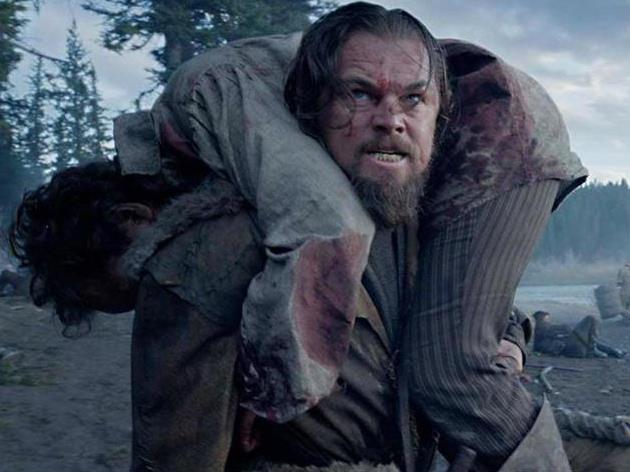Even if you blink, there’s no missing the moment that Hugh Glass (Leonardo DiCaprio, The Wolf of Wall Street) is attacked and mauled by a bear in The Revenant, the film that takes the real-life figure, passes him through the filter of Michael Punke’s book The Revenant: A Novel of Revenge, and endeavours to turn the resulting tale into something haunting in both the brutal and poetic senses of the word.
It’s a vicious scene, shot close in a single take with the type of intimacy and precision calculated to emulate actually being there as much as possible. Writer/director Alejandro González Iñárritu (Birdman, or The Unexpected Virtual of Ignorance) is determined to ensure audiences watch on in horror, unable to look away, and feel as though they’re suffering through something ferocious themselves. That’s his primary tactic for the entire feature as it flits between survivalist and revenge narratives.
In the 1820s, Glass finds himself in this unfortunate predicament during a trapping and hunting expedition focused on pelts for the fur trade, and after his group has been forced to flee an ambush by the local Native American populace. His grizzly encounter threatens to delay their escape, with Glass assumed dying afterwards. Captain Andrew Henry (Domhnall Gleeson, Star Wars: Episode VII – The Force Awakens) appoints John Fitzgerald (Tom Hardy, Legend), youngster Jim Bridger (Will Poulter, The Maze Runner), and Glass’ half-Pawnee son Hawk (feature debutant Forrest Goodluck) to wait, watch over him, and give him a proper burial; however profit, not patience or caring for a patient, is Fitzgerald’s priority. In attempting to hasten Glass’ demise for his own gain, Fitzgerald instead inspires an against-the-odds trek fuelled by vengeance.
Though snow and forest abound in its visuals, and misty desolation instead of sun-dappled vistas too, The Revenant wears its debts to the western genre in every frame, embracing the genre’s most basic components. Men carve their way through an unforgiving environment, fighting each other, animals, and the land’s original inhabitants, with endurance their ultimate aim. The film tries to bludgeon viewers with a primal spirit — its dialogue largely conveyed in grunts and moans, and the camera’s lens intermittently fogged up by Glass’ breath — but it more commonly comes across as primitive. Little in the Iñárritu and Mark L. Smith (The Hole)-co-written tale or its themes is expanded upon, even with the feature’s meditative tone, its emphasis on the misery of machismo and the cruelty of the elements, its attempts to address race and its allusions to spiritual significance. Instead, the work of actor DiCaprio and cinematographer Emmanuel Lubezki (Knight of Cups) is pushed to the fore to maintain the incessant tone of harshness, fill in the gaps, and patch over the slightness.
His performance may be pegged as awards bait, yet DiCaprio provides a commanding display of physicality that compels viewers to see his every drop of sweat and splatter of blood, hear every crack of his bones and feel his every ounce of exertion. Bursting beyond the story of man versus nature and right versus wrong, he sells Glass’ struggle and the fiery passion driving him more than the script cares to with its backstory of tragedy recalled in hallucinations. Playing against another textured example of villainy by Hardy helps his fortunes, though he is most ably supported not only by that mumbling foe but by Gleeson’s upstanding leader. All three inject a sense of humanity and immediacy into otherwise standard characters — a necessary inclusion, given that the screenplay only renders Glass, Fitzgerald, and Henry memorable not through their traits, but through their circumstances.
While DiCaprio’s dogged efforts lead The Revenant‘s cast through the hellish ordeal, giving flesh to the feature’s central tussle, they come second to Lubezki’s contribution. The film’s strongest aspect remains its imagery, as simultaneously moody and moving as grey-tinted landscapes littered with gruesome conflict can be. Behind the lens, he crafts frames with ethereal grace that defy the sights they contain. His vision is imbued with the fluidity that comes with swirling motions, 360-degree turns, wide vantages and long takes, and perfectly paired with a score by Ryuichi Sakamoto, Carsten Nicolai (collaborators on short The Veteran Hour) and Bryce Dessner (Big Sur) that’s both stripped back and layered — just as Iñárritu wants his movie to be, though the director doesn’t fare nearly as well as his craftsmen.
Indeed, the quandary of having too much of a good thing rears its head in relation to The Revenant‘s highlights, or of relying so heavily upon the production’s clear standouts that they begin to feel like gimmicks. Over 156 minutes, DiCaprio’s hulking, mostly silent portrayal and Lubezki’s visual marriage of bleakness and beauty are leaned upon with such emphasis, and asked to repeat the same beats so frequently, that their familiarity threatens to breed not spectacle or revelation or even the visceral thrust of violence also so relentlessly employed, but both exhaustion and complacency. One might be by design, but in a movie so adamant about stressing its strengths that it savages its star over and over again, the other is clearly far from intended.
Rating: 2.5 stars out of 5
The Revenant
Director: Alejandro González Iñárritu
USA, 2015, 156 mins
Release date: January 7
Distributor: Fox
Rated: M
Actors:
Director:
Format:
Country:
Release:





